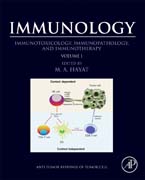
Immunology: Volume 1: Immunotoxicology, Immunopathology, and Immunotherapy
Hayat, M. A.
In spite of the huge investment of time, effort, and finance, the progress in preventing and/or curing serious diseases by using standard treatments (chemotherapy, radiotherapy, surgery, and hormone therapy) has been, at best, only modest. The use of standard treatments is accompanied by unavoidable, devastating side effects. At the cost of being repetitious, it has to be emphasized that an improved understanding of the immune system, avoidance of unhealthy habits (e.g., smoking, intake of alcohol, perpetual stress, and lack of exercise), and early detection (using biomarkers) are the only three friends we have to at least delay the onset of serious diseases. Discipline is required to accomplish this goal. A better understanding of the immune system needs to be given priority in the field of disease research. It is the immune system that informs the body the difference between its own antigens and foreign antigens, with implications for every event related to us, including health, disease, transplantation, blood donation, and choice of mate. To adequately function, the immune system must maintain an exquisitely specific response to a vast repertoire of potential antigens. Such a diverse response is controlled by genes coding for the a and B chains of the T-cell receptors (TCRs), which undergo somatic recombination and nucleotide insertion, resulting in the potential generation of a large number of different receptors. However, the immune system is not perfect, occasionally it strays into exaggeration. As time is not in favor of the cell when it comes under the influence of dysregulation of the immune system, the sooner the correct autoregulation is reinstated, the better it is for the cell and the body; immunomodulation is the answer. This volume focuses on the: Immunomodulation and the role of Autophagy Presents the most advanced information regarding the role of autophagy and immunityIntroduces new, more effective therapeutic strategies, in the development of targeted drugs and programmed cell death, providing information that will aid on preventing detrimental inflammationEdited work with chapters authored by leaders in the field around the globe - the broadest, most expert coverage available INDICE: General Applications 1. Cytotoxic T lymphocyte antigen 4 is a negative regulator of the immune system 2. PRDM1 regulates antigen presentation by MHC class 1 3. Determination of immunotoxicity of xenobiotics using human lymphoblastoid cell lines Immunology and Autophagy 1. Role of autophagy and immunity in aging 2. Enhancing immunity through autophagy 3. Role of Toll-like receptors in immunological autophagy 4. Protein Atg5 is essential for cellular immunity against intracellular pathogens 5. Role of autophagy in innate immunity 6. Autophagy genes in immunity 7. Molecules that positively or negatively regulate autophagy: underlying molecular mechanisms 8. Autophagy controls the anti-tuberculosis-vaccine Bacillus Calmette-Guérin 9. Role of autophagy in the major histocompatibility complex class II-mediated antigen presentation 10. Activation of autophagic programmed cell death and innate immune gene expression 11. Vaccine efficacy can be increased by augmenting autophagy-mediated antigen presentation 12. Atg5/Atg12 conjugate blocks innate antiviral immune responses, resulting in RNA virus replication in host cells
- ISBN: 978-0-12-809819-6
- Editorial: Academic Press
- Encuadernacion: Rústica
- Páginas: 360
- Fecha Publicación: 01/11/2017
- Nº Volúmenes: 1
- Idioma: Inglés
